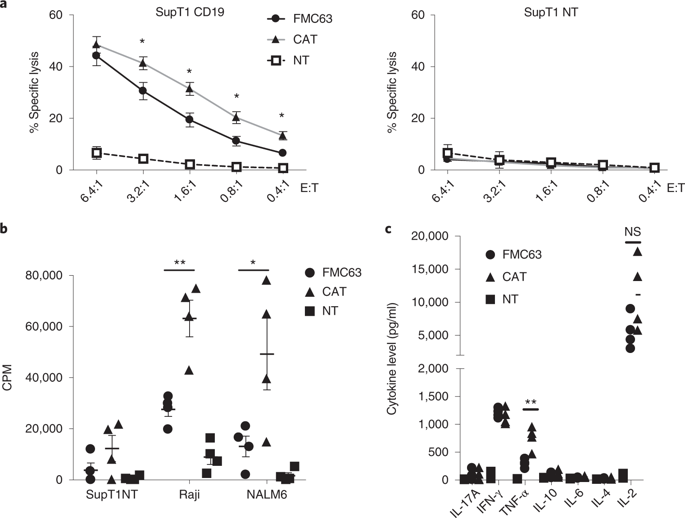Nature Medicine ( IF 58.7 ) Pub Date : 2019-09-02 , DOI: 10.1038/s41591-019-0549-5 Sara Ghorashian 1 , Anne Marijn Kramer 1 , Shimobi Onuoha 2 , Gary Wright 3 , Jack Bartram 3 , Rachel Richardson 1 , Sarah J Albon 1 , Joan Casanovas-Company 1 , Fernanda Castro 4 , Bilyana Popova 4 , Krystle Villanueva 4 , Jenny Yeung 1 , Winston Vetharoy 1 , Aleks Guvenel 1 , Patrycja A Wawrzyniecka 5 , Leila Mekkaoui 2 , Gordon Weng-Kit Cheung 5 , Danielle Pinner 3 , Jan Chu 3 , Giovanna Lucchini 3 , Juliana Silva 3 , Oana Ciocarlie 3 , Arina Lazareva 3 , Sarah Inglott 3 , Kimberly C Gilmour 6 , Gulrukh Ahsan 6 , Mathieu Ferrari 2 , Somayya Manzoor 2 , Kim Champion 4 , Tony Brooks 7 , Andre Lopes 4 , Allan Hackshaw 4 , Farzin Farzaneh 8 , Robert Chiesa 3 , Kanchan Rao 3 , Denise Bonney 9 , Sujith Samarasinghe 3 , Nicholas Goulden 3 , Ajay Vora 3 , Paul Veys 3 , Rachael Hough 10 , Robert Wynn 9 , Martin A Pule 5 , Persis J Amrolia 1, 3

|
Chimeric antigen receptor (CAR)-modified T cells targeting CD19 demonstrate unparalleled responses in relapsed/refractory acute lymphoblastic leukemia (ALL)1,2,3,4,5, but toxicity, including cytokine-release syndrome (CRS) and neurotoxicity, limits broader application. Moreover, 40–60% of patients relapse owing to poor CAR T cell persistence or emergence of CD19− clones. Some factors, including the choice of single-chain spacer6 and extracellular7 and costimulatory domains8, have a profound effect on CAR T cell function and persistence. However, little is known about the impact of CAR binding affinity. There is evidence of a ceiling above which increased immunoreceptor affinity may adversely affect T cell responses9,10,11. We generated a novel CD19 CAR (CAT) with a lower affinity than FMC63, the high-affinity binder used in many clinical studies1,2,3,4. CAT CAR T cells showed increased proliferation and cytotoxicity in vitro and had enhanced proliferative and in vivo antitumor activity compared with FMC63 CAR T cells. In a clinical study (CARPALL, NCT02443831), 12/14 patients with relapsed/refractory pediatric B cell acute lymphoblastic leukemia treated with CAT CAR T cells achieved molecular remission. Persistence was demonstrated in 11 of 14 patients at last follow-up, with enhanced CAR T cell expansion compared with published data. Toxicity was low, with no severe CRS. One-year overall and event-free survival were 63% and 46%, respectively.
中文翻译:

用低亲和力 CD19 CAR 治疗的儿童 ALL 患者的 CAR T 细胞扩增增强和持久性延长
靶向 CD19 的嵌合抗原受体 (CAR) 修饰的 T 细胞在复发/难治性急性淋巴细胞白血病 (ALL) 1,2,3,4,5中表现出无与伦比的反应,但毒性,包括细胞因子释放综合征 (CRS) 和神经毒性,限制更广泛的应用。此外,由于 CAR T 细胞持久性差或 CD19 -克隆的出现,40-60% 的患者会复发。一些因素,包括单链间隔子6和细胞外7以及共刺激域8的选择, 对 CAR T 细胞的功能和持久性有深远的影响。然而,关于 CAR 结合亲和力的影响知之甚少。有证据表明,免疫受体亲和力的增加可能会对 T 细胞反应产生不利影响9,10,11。我们生成了一种亲和力低于 FMC63 的新型 CD19 CAR (CAT),FMC63 是许多临床研究中使用的高亲和力粘合剂1,2,3,4. 与 FMC63 CAR T 细胞相比,CAT CAR T 细胞在体外显示出增殖和细胞毒性增加,并且具有增强的增殖和体内抗肿瘤活性。在一项临床研究 (CARPALL, NCT02443831) 中,12/14 名接受 CAT CAR T 细胞治疗的复发/难治性小儿 B 细胞急性淋巴细胞白血病患者获得了分子缓解。在最后一次随访时,14 名患者中有 11 名表现出持久性,与公布的数据相比,CAR T 细胞扩增增强。毒性低,没有严重的 CRS。一年总生存率和无事件生存率分别为 63% 和 46%。































 京公网安备 11010802027423号
京公网安备 11010802027423号